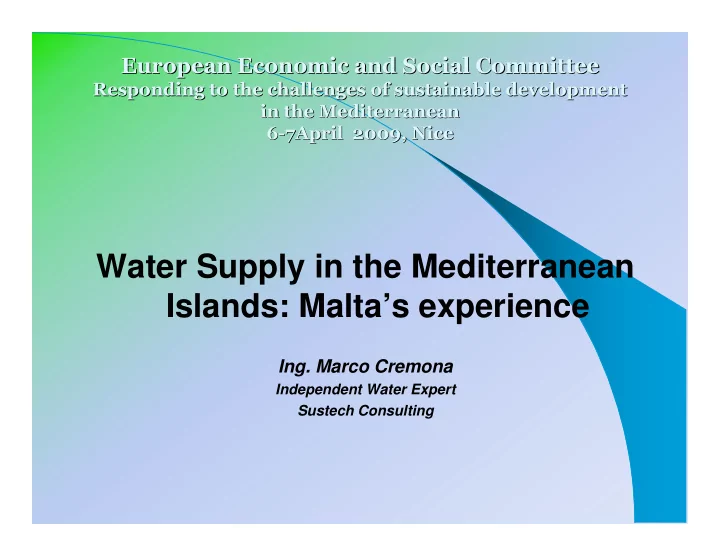

�������������������������������������� �������������������������������������� �������������������������������������������������������� �������������������������������������������������������� ���������������������� ���������������������� �� ������������ !�"��� ����������� !�"��� � Water Supply in the Mediterranean Islands: Malta’s experience Ing. Marco Cremona Independent Water Expert Sustech Consulting
���������� ���������� Fact 1: Malta has an intrinsic water scarcity problem Malta currently places 172 nd among 180 countries ranked by the FAO on the basis of availability of water resources. Malta has the highest Water Competitivity Index in the world.
��#�����$����������������%�����&��� ��#�����$����������������%�����&��� � Old limestone-hewn 5,000 year old water cisterns found in the vicinity of the prehistoric Mnajdra temples on Malta
���������� ���������� Fact 2: Unless immediate remedial action is taken, Malta’s groundwater reserves will be depleted within a few years The aquifers are being extracted at almost twice the recommended amount. This is resulting in a rapid deterioration of the quality of Malta’s groundwater reserves, the effects of which are already being felt today. Fact 3: Malta’s economic competitiveness is dependent on a sustainable yield of an inexpensive reliable water supply. At present, this takes the form of “free” and unregulated extracted groundwater Two-thirds of Malta’s economic activity depends on groundwater, a rapidly diminishing resource. The Malta Water Resources Review, 2006, states that “the costs of substituting groundwater with desalinated water will lead to a doubling of household water bills”.
���������� ���������� Fact 4: Climate change will further aggravate the situation “The biggest impact of Climate Change on Malta will be on the water table, which is not being replenished fast enough” Profs. Charles Sammut, national manager for the First Communication to the UNFCCC. Rainfall in the central Mediterranean could be down by as much as 30 per cent by 2080. .
'��������$������������������$� '��������$������������������$� In Malta, � - groundwater production (1960s to date) and - the of introduction of RO technology (early 1980s to date) have ‘solved’ the water scarcity problem and encouraged a “water culture” that takes only limited interest in conservation or efficient use of water resources. � As a result interest in efficient water use and sustainable water practices in Malta has declined – water in Malta is today under-valued as a resource – by politicians, industry, the tourist sector, agriculture and the consumer at large.
������ ������
������������������� ������������������� � Water is not a ‘sexy’ issue for local politicians . Politicians prefer quick-fix (and sometimes unsustainable) solutions that yield a ‘visible’ result in the short term. For example, inaugurating a new Reverse Osmosis plant looks good politically. Encouraging people to let go of their free groundwater supplies does not. � The end result is that Malta does not yet have a national water policy Malta will construct wastewater treatment plants that will not recover any water for irrigation or other 2 nd class uses; it seems that stormwater will continue to be discharged into the sea and not collected for re-use; and dependency on desalination will unfortunately continue to increase. � Town water prices continue to remain ridiculously low – even though water (and electricity) tariffs in Malta doubled 5 months ago. There is no sewerage charge in Malta. A typical household in Malta pays 7 times more in electricity bills than it pays for water.
'���(�$����(����) ) �������������� �������������� '���(�$����(���� ������������������� ������������������� � Appreciating that a problem exists (politicians, industrialists, farmers, stakeholders and civil society) – through better awareness of the consequences of not taking corrective action today. � Full and proper consultation leading to the preparation of a national water policy that manages to achieve political consensus and cross-party support . Staged and adaptive implementation in which demand management (including � pricing and equitable allocation of water) and the need to exploit alternative sources of water (treated sewage effluent, storm water and harvested rainwater) play a key role
'���(�$����(����) ) ���������������������$ ���������������������$ '���(�$����(���� � Inevitably, measures to address the water problem in Malta may have a negative impact on some commercial operations and the livelihoods of some users. Attempts should be made to minimize impacts on poorer social groups - by providing sustainable incentives.. � Civil society and its representatives (including the Maltese representatives in the EESC) cannot remain mere spectators but must seek to be actively involved in solving the problem .
Thank you for your attention
Recommend
More recommend